Pflugbeil, Curt Leopold, born 09-05-1890 in Hütten, Königstein,  Kingdom of Saxony, Germany. Curt’s father, Fritz Pflugbeil, owned a steam sawmill. Curt Pflugbeil’s mother was Sophie Pflugbeil, born Geißler. Pflugbeil had a brother, Generalleutnant Johann Karl Friedrich Pflugbeil
Kingdom of Saxony, Germany. Curt’s father, Fritz Pflugbeil, owned a steam sawmill. Curt Pflugbeil’s mother was Sophie Pflugbeil, born Geißler. Pflugbeil had a brother, Generalleutnant Johann Karl Friedrich Pflugbeil 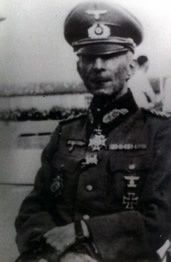
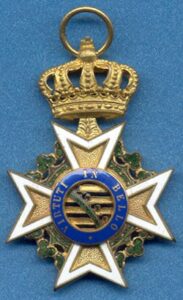 (1882-1951). Johann Pflugbeil joined the Saxon Army in 1904 and served in the 15th Infantry Regiment No. 181. During the First World War, from 1914 to 1918, Johan was a company commander and battalion commander on the Eastern Front and was awarded the Commander’s Cross, Second Class, of the Military Order of St. Henry on 03-11-1918. He had previously received both classes of the Iron Cross. Johann Flugbeil passed away age 69 on 21-10-1951 in Stuttgart-Degerloch.
(1882-1951). Johann Pflugbeil joined the Saxon Army in 1904 and served in the 15th Infantry Regiment No. 181. During the First World War, from 1914 to 1918, Johan was a company commander and battalion commander on the Eastern Front and was awarded the Commander’s Cross, Second Class, of the Military Order of St. Henry on 03-11-1918. He had previously received both classes of the Iron Cross. Johann Flugbeil passed away age 69 on 21-10-1951 in Stuttgart-Degerloch.
On 01-04-1910, Curt Pflugbeil enlisted in the Saxon Army and was assigned to the 10th Royal Saxon Infantry Regiment No. 134 in Plauen. 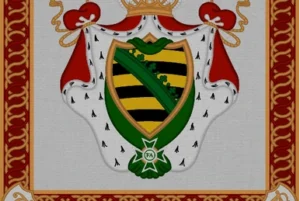 After attending the Kriegsschule (military school) in Hannover, Curt was promoted to Leutnant on 23-11-1911. He was then assigned as a company officer to the 2nd Company.
After attending the Kriegsschule (military school) in Hannover, Curt was promoted to Leutnant on 23-11-1911. He was then assigned as a company officer to the 2nd Company.
During the First World War he also belonged to the 15. Königlich Sächsisches Infanterie-Regiment Nr. 181. 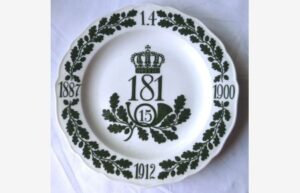 Pflugbeil was deployed as a company commander on the Eastern Front. As a platoon leader, Pflugbeil and his regiment participated in the First World War on the Western Front. In June 1915, as commander of a Machine Gun company, he prevented a decisive breakthrough by enemy troops at Givenchy-lès-la-Bassée on the Artois Front. For this, Pflugbeil was, like his brother, awarded the Military Order of St. Henry by King Frederick Augustus III of Saxony on 21-07-1915.
Pflugbeil was deployed as a company commander on the Eastern Front. As a platoon leader, Pflugbeil and his regiment participated in the First World War on the Western Front. In June 1915, as commander of a Machine Gun company, he prevented a decisive breakthrough by enemy troops at Givenchy-lès-la-Bassée on the Artois Front. For this, Pflugbeil was, like his brother, awarded the Military Order of St. Henry by King Frederick Augustus III of Saxony on 21-07-1915.
On 23-04-1918, he was seriously injured in a plane crash. After a hospital stay and subsequent leave, Pflugbeil did not return to service until 01-08-1918, where he was assigned to Armeeflugpark 11. He remained with this unit until after the end of the war and the demobilization of the air park on 13-01-1919. Pflugbeil had been awarded both classes of the Iron Cross of 1914. ![]()
On 31-03-1928, he resigned from active service. And from 01-04-1928, disguised as a civilian, he traveled to the Soviet Union, Sweden, and Italy to secretly build an air force. This was done solely for camouflage, and he spent the next three years undergoing various secret pilot training programs. On 01-04-1931, Pflugbeil was reinstated in the Reichswehr as Rittmeister (Red Chief of Staff) with his RDA. In April 1931, he was assigned to the staff of the 3rd Division of the Reichswehr ![]() under command of Generalmajor Gustav Adolf ” Hugo” Zeitz in Berlin. On 01-11-1931, Pflugbeil was promoted to Major.
under command of Generalmajor Gustav Adolf ” Hugo” Zeitz in Berlin. On 01-11-1931, Pflugbeil was promoted to Major.
During the general mobilization, Pflugbeil was appointed commander of Luftgaustab z.b.V. 8 in Luftgau VIII 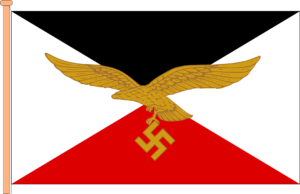 on 07-08-1939. He also served in this position at the beginning of World War II. Subsequently, from 08-10-1939, to 23-06-1940, he was commander of Luftgaustab z.b.V. 16. After the Battle of France, Pflugbeil was appointed Kommandierender General (Commanding General) and commander of Luftgau Belgium-Northern France. On 20-08-1940, he was appointed Kommandierender General of IV. Fliegerkorps, which he commanded primarily on the Eastern Front until 03-09-1943. On 01-09-1940, he was promoted to Generalleutnant.
on 07-08-1939. He also served in this position at the beginning of World War II. Subsequently, from 08-10-1939, to 23-06-1940, he was commander of Luftgaustab z.b.V. 16. After the Battle of France, Pflugbeil was appointed Kommandierender General (Commanding General) and commander of Luftgau Belgium-Northern France. On 20-08-1940, he was appointed Kommandierender General of IV. Fliegerkorps, which he commanded primarily on the Eastern Front until 03-09-1943. On 01-09-1940, he was promoted to Generalleutnant. ![]() From the summer of 1941, IV. The Fliegerkorps was deployed in the southern sector of the Eastern Front. For his leadership achievements, he was awarded the Knight’s Cross of the Iron Cross on 05-10-1941. On 04-09-1943, Pflugbeil relinquished command to General der Flieger Rudolf Meister.
From the summer of 1941, IV. The Fliegerkorps was deployed in the southern sector of the Eastern Front. For his leadership achievements, he was awarded the Knight’s Cross of the Iron Cross on 05-10-1941. On 04-09-1943, Pflugbeil relinquished command to General der Flieger Rudolf Meister.
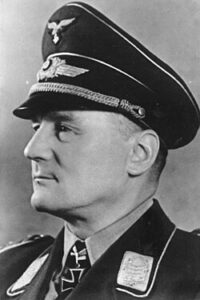
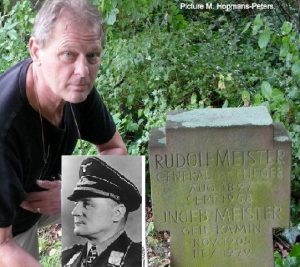 He had already been awarded both classes of the 1939 Repetition Clasp to the Iron Cross. From the summer of 1944, Pflugbeil was appointed Commander in Chief of Luftflotte 1 (1st Air Fleet).
He had already been awarded both classes of the 1939 Repetition Clasp to the Iron Cross. From the summer of 1944, Pflugbeil was appointed Commander in Chief of Luftflotte 1 (1st Air Fleet). 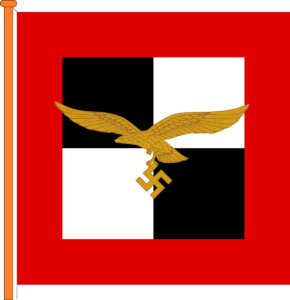 He held this position until 17-04-1945, after which Luftflotte 1 was renamed the Luftwaffen-Kommandos Kurland. On 27-08-1944, he was awarded the Knight’s Cross of the Iron Cross with Oak Leaves
He held this position until 17-04-1945, after which Luftflotte 1 was renamed the Luftwaffen-Kommandos Kurland. On 27-08-1944, he was awarded the Knight’s Cross of the Iron Cross with Oak Leaves ![]() for his leadership during the defensive battles. On 08-05-1945, he was taken prisoner by the Russians.
for his leadership during the defensive battles. On 08-05-1945, he was taken prisoner by the Russians.
Death and burial ground of Pflugbeil, Curt Leopold.
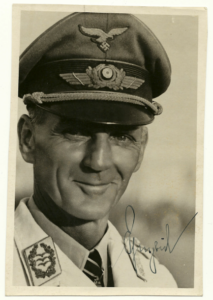
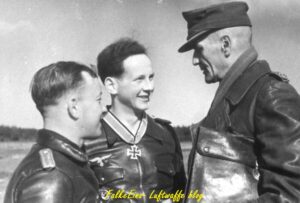
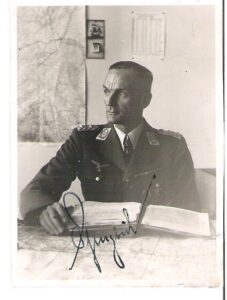
On 08-06-1950, Pflugbeil was sentenced to 25 years’ forced labour in Moscow. However, due to poor health, which he suffered from bladder cancer, he was released from captivity on 04-01-1954. He returned to the Federal Republic of Germany, and died on 31-05-1955. age 65, in Vienna. Pflugbeil is buried with his wife Marie Pflugbeil, at the Friedhof Wilmersdorf, Wilmersdorf, Charlottenburg-Wilmersdorf, Kalischer Str. 17, 10713 Berlin, Germany.
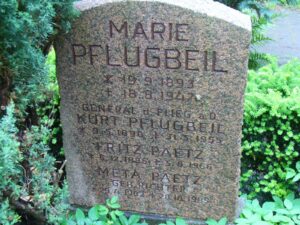









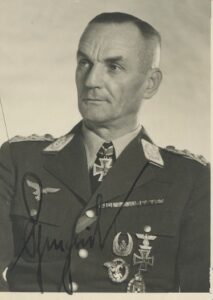









Leave a Reply